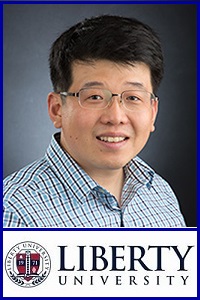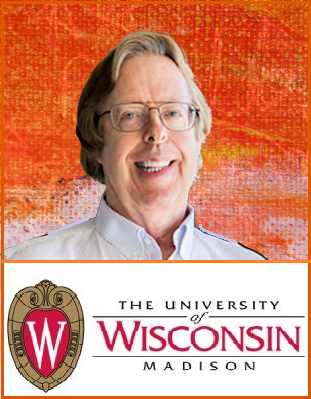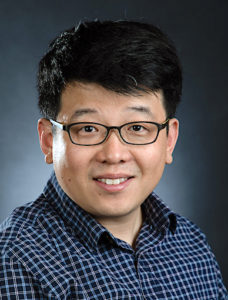Tagged: “Dr. Jichan J. Kim”
Forgiveness Education for Students in Nursing Program Helps Reduce Anxiety and Depression
A research study published last month, utilizing Dr. Robert Enright’s forgiveness intervention model, showed that students in college nursing programs would benefit from a forgiveness intervention in the areas of self-care and forgiveness facilitation.
The nursing students, randomly assigned to either an experimental group or a no-contact control group, used Dr. Enright’s book 8 Keys to Forgiveness as the project’s treatment manual. After studying one chapter a week for 8 weeks, the students in the experimental group showed greater improvement in forgiveness compared to those in the control group from the pretest to the posttest which was maintained at the four-week follow-up. In addition, those in the experimental group showed statistically significant decreases in anxiety, depression, and fatigue from pre-testing to both post-testing and follow-up testing periods.
The study was conducted by a team of 8 researchers from the Liberty University School of Nursing (Lynchburg, VA) under the direction of Jichan J. Kim, Associate Professor of Psychology at Liberty. Dr. Kim has been the lead investigator on more than a dozen forgiveness-related studies over the past several years.
This latest study, The Efficacy of a Forgiveness Bibliotherapy: A Randomized Controlled Trial with Nursing Students, was published in the Journal of Holistic Nursing (JHN) on Jan. 10, 2022. JHN is a peer-reviewed quarterly journal with a focus on advancing the science and practice of holistic nursing and healthcare.
“The need for forgiveness education for nursing students has risen dramatically as responsibilities have broadened for nursing professionals,” according to Dr. Kim. “Our study positively demonstrated that the use of bibliotherapy can be a cost-effective way to promote the virtue of forgiveness for nursing students who are likely to be in need of exercising self-care and would have opportunities to facilitate forgiveness for their patients.”
Bibliotherapy, Dr. Kim explained, is a therapeutic approach that uses literature (in this case Dr. Enright’s 8 Keys to Forgiveness) to support good mental health. This study, he added, demonstrated not only the effects of forgiveness, as numerous studies have done in the past, but also the feasibility of using a forgiveness bibliotherapy that can be easily adopted into the existing nursing curriculum.
That same approach has been used by Dr. Enright, co-founder of the International Forgiveness Institute (IFI) and the man Time magazine calls “the forgiveness trailblazer,” in a slightly different format over the past two years. Dr. Enright has worked with Dr. Chontay Taylor Glenn, PhD, RN, PMHNP-BC, to enroll a total of eight University of Michigan-Flint nursing students in the IFI’s Forgiveness Therapy training course.
Dr. Glenn is Assistant Professor & Project Director of the Psychiatric Mental Health Nurse Practitioner Residency Program at UM-Flint. In addition to incorporating the IFI’s forgiveness training into the curricula for her nursing students, she also developed a program through which nine Flint-area community counselors completed the Forgiveness Therapy online continuing education course. Dr. Kim provided three hour-long training sessions by Zoom as part of that collaborative effort between Dr. Glenn, Dr. Enright, and himself.
The newly trained counselors in Flint are also undertaking an expanded role in their community, according to Dr. Glenn–providing forgiveness education classes and case coordination to Flint-area adolescents who have experienced adverse childhood experiences. The project is funded by a grant from the W.K. Kellogg Foundation in Battle Creek, MI.
About Dr. Kim
Jichan J. Kim is an Associate Professor of Psychology and the Director of the M.A. in Applied Psychology program at Liberty University, Lynchburg, VA. His research interests include the effects of interpersonal and intrapersonal forgiveness as well as the integration of psychology and Christianity.
Dr. Kim has degrees from the University of Wisconsin-Madison (M.S. & Ph.D.), Harvard University (Ed.M.), Gordon-Conwell Theological Seminary (M.Div. & M.A.), and City College of New York (B.A.). He also has extensive ministry experience in New York City, Boston, and Madison (WI), serving various age groups in Korean immigrant congregations.
Learn More:
- Nursing Students Research Report Abstract
- Bibliotherapy Defined
- Overview of the IFI’s Forgiveness Therapy Course
A School Anti-Bullying Program That Works!
No one argues about the need to stop bullying in schools. Bullying’s adverse effects not only impact the child when the bullying occurs but typically impact a victim’s health and emotions throughout the person’s lifetime (see “The Impact of Bullying” box below).
That reality has become a growing topic of concern in the academic community with bullying being cited as a universal problem in countries around the world. Over the past several decades, literally hundreds of school-wide anti-bullying programs have been developed and implemented. That raises the question, of course: Do school antibullying programs work?
The typical answer from those professionals studying that question is: “Not so well. We need to do better.”
And sure enough, that’s the inauspicious conclusion of a just-completed systematic review of scientific publications covering the past 20 years. According to the study, Whole‐school Antibullying Interventions, a full 50% of all the school programs reviewed failed to “show significant effects on bullying prevalence” or found negative results including an actual increase in bullying.
The study, published in April by the peer-reviewed journal Psychology in the Schools, was conducted by university researchers in Brazil. While their study found that anti-bullying interventions resulted in increased reporting of bullying occurrences (with resultant increases in the use of punitive discipline), at the same time many of the programs failed totally–primarily due to inadequate time for training and implementation as well as lack of support.

Dr. Jichan J. Kim
Those findings come as no surprise to many psychologists. In fact, the report actually documented and reinforced what educational psychologist Dr. Jichan J. Kim first reported more than four years ago in his University of Wisconsin-Madison doctoral thesis: The Effectiveness of a Forgiveness Intervention Program on Reducing Adolescents’ Bullying Behavior.
Dr. Kim’s thesis includes a 29-page literature review in which he documents the unusually large number of research projects demonstrating the ineffectiveness of most school-wide anti-bullying programs including:
- A 2007 review of 45 separate school-based anti-bullying studies involving 34,713 individuals that concluded “the positive changes were too small to be supported as significant;”
- Another 2007 examination of 16 major anti-bullying programs across 11 different countries that showed mixed results with less than half the programs demonstrating desirable effects;
- A 2008 evaluation of 16 studies across 6 nations involving a total of 15,386 K-12 students that showed the interventions tended to influence students’ attitudes and self-perceptions but not their bullying behavior; and,
- Studies completed in 2012, 2014, and 2015 (one involving 560 school psychologists and school counselors) supporting the lack of evidence-based interventions.
Despite all the negative assessments he uncovered, Dr. Kim believes there is one approach that might be effective–helping adolescents exhibiting bullying behavior to forgive those who have offended them in the past. That approach, Dr. Kim says, is still not widely used and is, therefore, still not a compelling component of the scientific literature although he is confident it “can be beneficial.”

Dr. Robert D. Enright
That intervention approach, in fact, is the one advocated in The Anti-Bullying Forgiveness Program developed more than 8 years ago by Dr. Robert Enright, founder of the International Forgiveness Institute. The program not only incorporates lessons-learned from Dr. Enright’s more than 40-years of forgiveness research, it also integrates the scientifically-quantifiable forgiveness process he developed and , perhaps most importantly, it focuses directly on the one doing the bullying.
“Those who bully usually have pent-up anger and as a result they displace their own wounds onto others,” Dr. Enright explains. “Our program is meant to take the anger out of the heart of those who bully so that they no longer bully others.”
Dr. Enright says his research has taught him to take an approach that may seem counter-intuitive today, but will appear obvious to many in the future: “Yes, help the victim, but also help the one who is bullying to get rid of his or her anger, which is fueling the bullying. Those who bully have been victimized by others. Help them to reduce their resentment toward those who were the victimizers and the bullying behavior will melt away.”
- Learn more about Dr. Enright’s Anti-Bullying Forgiveness Program.
- Learn more about Dr. Jichan Kim, an Assistant Professor of Psychology at Liberty University in Lynchburg, VA. (Disclosure: Dr. Enright was Jichan Kim’s graduate school adviser).
- Read a review of Forgiveness Therapy.
- Learn more about the long-term impacts of bullying in the 2014 British Study.
- Learn how bullying statistics compare in your state versus others, with this interactive Bullying-Cyberbullying-Sexting Map of the U.S.
- Learn about bullying and cyberbullying in your country with this interactive International Research on Bullying Map of the World.
Forgiveness Spotlight: Dr. Jichan J. Kim
Editor's Note: This is the first in a series of articles that will focus on former students of Dr. Robert Enright who have continued their forgiveness research activities after graduation and who have made their own mark on the forgiveness movement.
Dr. Jichan J. Kim is a South Korean native who studied under Dr. Enright for four years at the University of Wisconsin-Madison where he earned both his Masters and Ph.D. degrees in Educational Psychology while at the same time pursuing research projects that led Dr. Enright to call him “one of the most prolific graduate assistants I’ve ever instructed.”

Dr. Jichan J. Kim
During those four years, the two researchers worked together to conduct numerous forgiveness-related research projects including a study that explored how graduate-level theology students in South Korea perceived the difference between divine forgiveness and human forgiveness. The results of that project were published just last month in the Journal of Spirituality in Mental Health.
After graduation, Dr. Kim left UW-Madison to become Assistant Professor of Psychology at Liberty University in Lynchburg, VA–a world-class Christian university founded by Dr. Jerry Falwell who gained international fame as an advisor to world leaders and who was named one of the 25 Most Influential People in America by U.S. News & World Report in 1983. Liberty University is one of the largest Christian universities in the world with more than 15,000 students attending classes on campus and more than 94,000 students taking courses through Liberty University Online.
At Liberty University, Dr. Kim teaches Introduction to Research, Directed Research, and Psychology and Christianity. In Spring 2020, he is teaching a
semester-long, special topics course in forgiveness,
for which he is very excited. He is also leading a Psychology Study Abroad Trip to South Korea in June 2020 where students will learn about: 1) the aspects of a collectivistic culture in contrast to an American individualistic culture; and, 2) how that culture views forgiveness and reconciliation.
The full course load complements Dr. Kim’s research activities. Since leaving UW-Madison three years ago, Dr. Kim has become even more intricately involved in forgiveness research and forgiveness education both in the US and in his home country of South Korea. His research and studies, for example, have:
- Examined the relationship between forgiveness and compassionate love;
- Explored the idea of the school as the Just and Merciful Community;
- Validated the Enright Self-Forgiveness Inventory;
- Examined subjective reasons why individuals forgive;
- Evaluated, together with his undergraduate research team at Liberty University, the effectiveness of a family-based forgiveness program with more than a dozen volunteer families; and,
- Explored the relationship between interpersonal, self-, and divine forgiveness.
“I give special thanks to Dr. Enright for introducing to me the beauty of forgiveness. I owe him a great deal and I will try my best to follow in his footsteps through a life dedicated to driving out hatred through forgiving love.”
Dr. Jichan J. Kim
 In addition to his UW-Madison degrees, Dr. Kim has received degrees from Harvard University (Cambridge, MA), Gordon-Conwell Theological Seminary (South Hamilton, MA), and City College of New York. He also has extensive ministry experience in Madison, New York City, and Boston (serving various age groups in Korean immigrant congregations).
In addition to his UW-Madison degrees, Dr. Kim has received degrees from Harvard University (Cambridge, MA), Gordon-Conwell Theological Seminary (South Hamilton, MA), and City College of New York. He also has extensive ministry experience in Madison, New York City, and Boston (serving various age groups in Korean immigrant congregations).
Dr. Kim and his wife, Jieun, have three children–Yewon (Arianna), Juwon (Aiden), and Sungwon (Joseph). For the past several years, Dr. Kim has financially supported the International Forgiveness Institute with an automatic monthly donation through PayPal. He says he has two favorite quotes he tries to live by:
- Love never fails. (1 Corinthians 13:8)
- Forgiveness is offering love to a person in the face of injustice and at a time when that person is most unlovable. (Dr. Robert Enright)
Read more:
- Dr. Kim’s biography on the Liberty University website.
- Dr. Kim’s Ph.D. Dissertation on the effectiveness of anti-bullying programs.
- Abstracts of all Dr. Kim’s Forgiveness Research Studies.
- Inoculating Children Against Violence through Forgiveness Education – a Poster Presentation jointly developed by Dr. Kim and Dr. Enright.




